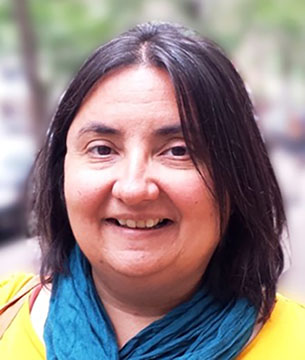
Stavroula Foteinopoulou
In this installment of Senior Member Insights, OPN talks with Stavroula Foteinopoulou—a research professor in the Electrical and Computer Engineering Department at the University of New Mexico, USA. After receiving her Ph.D. in condensed-matter physics, Foteinopoulou held postdoctoral positions at the University of Namur in Belgium and the Institute of Electronic Structure and Laser (IESL) FORTH in Greece, and then was a lecturer at the University of Exeter in the U.K. Her current work in theoretical photonics focuses on conceiving new structured materials for extraordinary light control across the electromagnetic spectrum.
What first interested you in pursuing science?
Since I can remember, I was always curious about how things around us work—why there is a rainbow, why phenomena occur the way they do. In elementary school, a fantastic teacher, Mr. Chamos, introduced me to physics and its world of possibilities. He read stories to my class about different inventors and how so many things we enjoy today we owe to their passion and dedication to science. I wanted to learn and understand more about physical phenomena, which led me to pursue physics for my undergraduate education, and eventually for a Ph.D. and a career.
What aspect of your current work do you find the most interesting or exciting?
Doing research, finding something unexpected in your results and trying to explain it.
What tips for successful networking do you have for early-career professionals?
I’m not sure there is a certain recipe. I think different approaches work better for different people. It helps to be yourself, be confident, and to not be afraid to reach out. Participating in conferences and conference events is great, but I also think a good opportunity to build up professional bonds is to engage with volunteer activities and professional societies such as OSA, SPIE, APS and IEEE.
What professional resources do you rely on to stay active and engaged with your field?
Journal publications, of course, but magazines such as Optics & Photonics News and Physics Today are also great for a broader view of the trends around your field.
Now, in COVID-19 times, I tend to also attend quite a few webinars and Zoom or recorded conference presentations. I miss the face-to-face conferences, however, as the opportunity for interactions and discussions with colleagues are just not the same in these remote conferences or seminar events.
What’s the best career decision you’ve ever made, and why?
My decision to pursue a Ph.D. The world of research is just so fantastic. Every day is different, and it’s very exciting when you try to find something new and make small steps each day toward understanding something better. I wouldn’t have had this incredible opportunity to be part of this world had I not decided to go forward with my doctoral studies.
Describe a major turning point in your career. Was there a specific action/accomplishment that got you there?
I would have to say my first faculty appointment. It’s sort of a “quantum” leap from being a postdoc. It involves more diverse responsibilities, which makes it necessary to develop a diverse set of skills, and you must learn how to get out of your comfort zone. I would say that a long-standing perseverance in quality research led me there rather than a specific action or accomplishment.
What is one piece of advice that you wish you were given as a student/early in your career?
Form mentorship relationships and seek career advice from many people in your environment, including your peers.
How important are leadership roles in career development, and how do you hone your leadership skills?
I think leadership skills are invaluable. Unfortunately, this is one area in which scientists typically do not receive formal training. Rather, you sort of try to pick up leadership skills along the way, and it helps learning from senior colleagues you look up to. However, I still believe some structured training in leadership would have been helpful. OSA organizes related webinars or events at conferences, and I try to attend these as I have found them quite useful.
At this point in your career, what are you most looking forward to next?
I’m looking forward to continuing to find exciting problems to research.
If you weren’t in the sciences, what would be your dream career?
Something creative like a fashion or interior designer or a photographer.
